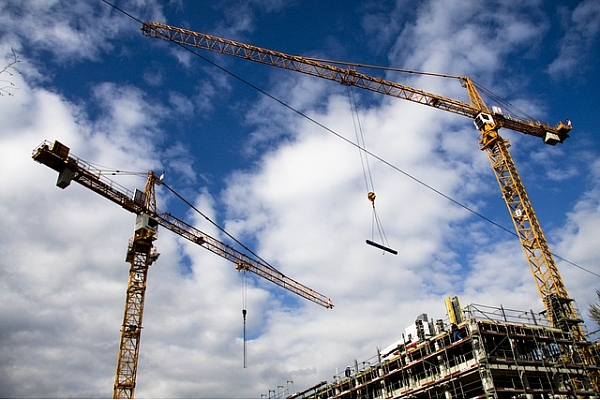Construction costs in Latvia down 0.5%
Construction sector in brief
- In regards to the proportion of the sector’s overall turnover, 46% of overall turnover is made up of construction and finishing work, 24% is made up of the sale of construction materials, 17% construction of roads and bridges, 8.6% manufacturing of construction materials, and 5.5% architectural and design services.
- 3,085 companies operated in the construction sector in Latvia in 2015, which employed 65,000 workers. The sector’s total turnover was at EUR 5.208 billion in 2015, with profits at EUR 117 million.
- Approximately EUR 8 billion is needed for the renovation of Soviet-era buildings throughout the country. About EUR 4 billion is needed in Riga, where approximately half of these types of buildings are located. There are about 38,000 Soviet-era buildings throughout the country. As of today, approximately 650 Soviet era building have been renovated, and another 1,700 could be renovated with the help of EU funding.
Reduction in construction costs last year
Construction costs in Latvia declined 0.5 percent in 2016 when compared to the previous year, the data of the Central Statistics Bureau show. Last year, builders' wages climbed 4.8%, maintenance and operational costs of machinery and equipment rose 1.1%, but prices of construction materials dropped 3.2% year-on-year. In 2016, data on the prices of construction resources are provided by about 180 construction companies and over 30 distributors of construction materials.
25% growth and EUR 600 million worth investments expected this year
As EU funds are being released to Latvia, the member state's construction sector is projected to grow by 25% year-on-year in 2017, which causes huge risks to the industry, the Economy Ministry admits. It is projected that investments in the construction sector will exceed EUR 600 million. An 8% growth against 2017 is being projected also for 2018, and a 10% growth is forecast for 2019. At the same time, the ministry warns that such excessive growth will affect quality and productivity and push up prices. Construction costs are going to climb 6% in 2017, with builders' wages expected to rise at the same pace. In 2017 and the following years the construction sector is going to need additional 6,000-10,000 workers, but their hiring and qualification are likely to cause problems. Attracting skilled employees in the short-term will be impossible, so it will be necessary to consider importing them from foreign countries, the ministry believes. The ministry also points out that more careful planning will be needed for the EU's next programming period to avoid such excessive slumps and rises in the future. The ministry also noted the need to attract private investment for the construction sector to lessen the importance of EU funding in construction. The Partnership for Latvian Construction Entrepreneurs also predicts that Latvia could see a construction bubble in 2018, partly created by the state. This will be a period when not only EU funded projects will be implemented, but also with the Connecting Europe Facilities program for infrastructure projects will begin - rail electrification, a third electric energy connection between Latvia and Estonia, as well as the Kurzemes Loks power-line project from Ventspils to Riga and more. Even though the projects can be implemented by 2023, it looks like most of them will be implemented between 2018 and 2020. The Partnership has called on the Finance Ministry and Economy Ministry to coordinate all public sector procurements in the construction sector, so to make sure there is a more measured volume of procurements between 2017 to 2021, so that a bubble does not form in the sector, which would lead to an unjustified increase in prices and lower construction quality.
IKEA to build store on outskirts of Riga
The Swedish company IKEA will be opening its first furniture store in Latvia, which is scheduled for opening outside Riga in August 2018, with investments in the store planned at EUR 60 million. Construction of the IKEA store is to begin in the region of Stopiņi, just outside Riga, in the spring of 2017, and the store has to be completed in about one and a half year. It is expected that around 300 builders will be involved in the construction project. The IKEA store, which will be 34,500 square meters large, will be built on a ten hectares large land plot. The IKEA store in Stopiņi will provide jobs to some 400 people. The store will be managed by Paul Mason Properties Ltd, after signing a franchise agreement with Inter IKEA Systems BV. Paul Mason Properties is fully owned by the Netherlands registered company FE Corporation B.V. Netherlands. Founded in 1943, the Swedish furniture and household goods giant IKEA now has about 400 stores in nearly 50 world countries. IKEA's only store in the Baltic countries at the moment opened in Vilnius in 2013.
Lithuanians invest EUR 50 million in construction of new business center in Riga
Property developer Hanner Uznemumu Grupa (Hanner) is set to invest EUR 50 million in two new business centers, Teodors and Henrihs, which will be built in the new Riga neighborhood of Jaunā Teika. The new business centers Teodors and Henrihs will add 39,000 square meters of office space to the already existing offices in Jaunā Teika, making it the largest office complex in Riga. A total of EUR 60 million has already been invested in the Jaunā Teika neighborhood the past ten years.
Nordic Homes to build village of timber frame houses in Sweden
Timber frame module manufacturer Nordic Homes has signed a contract with Swedish company Veidekke on supplying modules for the construction of 23 residential row houses in the Skane County of Sweden. The project consists of 23 two-story residential row houses with typical Scandinavian architecture. It combines a modern design with environment-friendly and innovative technologies, which ensures a high energy-efficiency standard. The living-space of each apartment is between 89 and 120 square meters. 92 modules in total are required for the project. Both companies plan on developing their mutual cooperation for similar project in the future. For Nordic Homes this agreement means expanding into new markets and increasing the volume of export, as well as improving manufacturing efficiency according to Swedish building standards. Nordic Homes is one of the largest timber frame module manufacturer in the Baltic countries. The company was founded in 2010 and has since carried out more than 50 building projects in Latvia and the United Kingdom. The modules are manufactured and fully equipped with engineer networks, furniture and finished internal and external design, and they are used in constructing public buildings and private homes. 90% to 95% of Nordic Homes’ overall turnover makes up exports, while 5% to 10% of its products remain in Latvia, where timber frame modules are mostly used for the construction of private homes.
EUR 312 million worth of EU funds available for renovation of roads
In 2016, the Latvian Central Finance and Contracting Agency approved projects for renovation of roads with financing from the EU Cohesion Fund – 13 projects for renovation of main public roads with total value of EUR 183.5 million and 15 projects for renovation of regional roads with total value of EUR 128.7 million. The state-owned road maintenance company Latvijas Valsts Ceļi said that in 2014 it was the first to begin absorption of the EU financing in the new programming period. This year, road construction projects financed by the Cohesion Fund and the European Regional Development Fund (ERDF) have been approved and are being implemented in Latvia.





